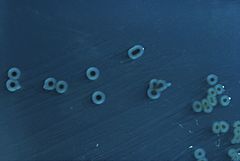Salmonella enterica facts for kids
Quick facts for kids Salmonella enterica |
|
|---|---|
 |
|
| S. enterica Typhimurium colonies | |
| Scientific classification | |
| Kingdom: | |
| Phylum: | |
| Class: | |
| Order: | |
| Family: | |
| Genus: | |
| Species: |
S. enterica
|
| Binomial name | |
| Salmonella enterica (ex Kauffmann & Edwards 1952)
Le Minor & Popoff 1987 |
|
Salmonella enterica is a tiny, rod-shaped living thing called a bacterium. It is a very common type of bacteria found in the Salmonella family. These bacteria are so small you need a microscope to see them!
Salmonella enterica is known for causing an illness called typhoid fever. This sickness can make people feel very unwell. The main way people get infected is by swallowing water that has these bacteria in it. Food can also become contaminated if it is washed or grown with unsafe water.
Contents
What are Bacteria?
Bacteria are tiny, single-celled organisms. They are found almost everywhere on Earth. Some bacteria are helpful, like those in your gut that help digest food. Others, like Salmonella, can cause diseases.
How Bacteria Live
Bacteria are very simple living things. They do not have a nucleus like plant or animal cells. They reproduce very quickly, often by simply splitting into two new cells. This allows them to spread easily in the right conditions.
Understanding Typhoid Fever
Typhoid fever is a serious illness caused by Salmonella enterica. It is different from the common stomach flu. This disease can affect many parts of the body.
Symptoms of Typhoid Fever
When someone gets typhoid fever, they might feel sick in several ways. Common symptoms include feeling like you need to throw up or actually vomiting. A high fever is also a very common sign. People might also have headaches, weakness, or a rash.
How Typhoid Spreads
Typhoid fever spreads through contaminated food and water. This means water or food that has come into contact with the bacteria. For example, if someone with the infection doesn't wash their hands properly, they can spread the bacteria. These bacteria can then get into food or water.
Staying Safe from Salmonella
It is important to take steps to avoid getting sick from Salmonella. Good hygiene and safe food practices are key.
Safe Food and Water Practices
- Always wash your hands with soap and water. Do this especially before eating or preparing food. Also wash your hands after using the bathroom.
- Make sure your drinking water is clean and safe. If you are unsure, boil water before drinking it.
- Cook food thoroughly, especially meat, poultry, and eggs. This kills harmful bacteria.
- Wash fruits and vegetables well before eating them.
- Avoid cross-contamination in the kitchen. Use separate cutting boards for raw meat and other foods.
See also

- Salmonella enterica para niños (in Spanish)
 | Precious Adams |
 | Lauren Anderson |
 | Janet Collins |

